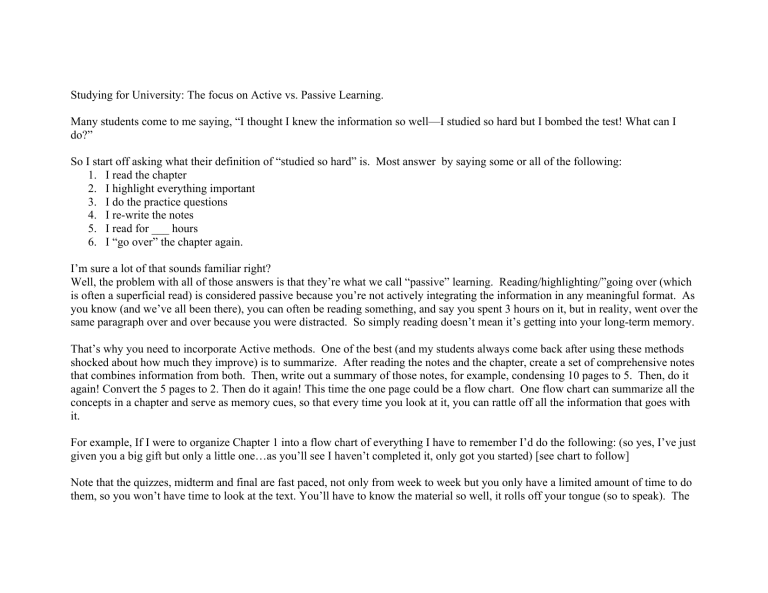
Studying for University: The focus on Active vs. Passive Learning. Many students come to me saying, “I thought I knew the information so well—I studied so hard but I bombed the test! What can I do?” So I start off asking what their definition of “studied so hard” is. Most answer by saying some or all of the following: 1. I read the chapter 2. I highlight everything important 3. I do the practice questions 4. I re-write the notes 5. I read for ___ hours 6. I “go over” the chapter again. I’m sure a lot of that sounds familiar right? Well, the problem with all of those answers is that they’re what we call “passive” learning. Reading/highlighting/”going over (which is often a superficial read) is considered passive because you’re not actively integrating the information in any meaningful format. As you know (and we’ve all been there), you can often be reading something, and say you spent 3 hours on it, but in reality, went over the same paragraph over and over because you were distracted. So simply reading doesn’t mean it’s getting into your long-term memory. That’s why you need to incorporate Active methods. One of the best (and my students always come back after using these methods shocked about how much they improve) is to summarize. After reading the notes and the chapter, create a set of comprehensive notes that combines information from both. Then, write out a summary of those notes, for example, condensing 10 pages to 5. Then, do it again! Convert the 5 pages to 2. Then do it again! This time the one page could be a flow chart. One flow chart can summarize all the concepts in a chapter and serve as memory cues, so that every time you look at it, you can rattle off all the information that goes with it. For example, If I were to organize Chapter 1 into a flow chart of everything I have to remember I’d do the following: (so yes, I’ve just given you a big gift but only a little one…as you’ll see I haven’t completed it, only got you started) [see chart to follow] Note that the quizzes, midterm and final are fast paced, not only from week to week but you only have a limited amount of time to do them, so you won’t have time to look at the text. You’ll have to know the material so well, it rolls off your tongue (so to speak). The only way to do that is to take the time to get the information into long term memory. And to do that you have to use active methods of learning like I’ve suggested. Additional ways include the tips in your memory chapter (effective encoding, mnemonics etc). What is psychology Beliefs about psychology Definition of psychology Thinking critically Empirical vs psychobabble 8 Methods of Critical thinking History of psychology Pre-modern Today’s psychology Structuralism Vs functionalism Vs psychoanalysis 7 Forms of psychology What do psychologist do?



